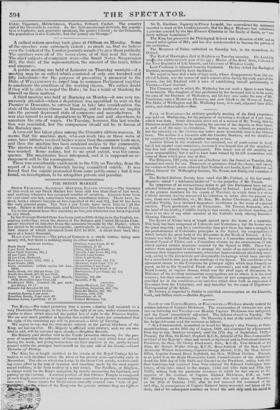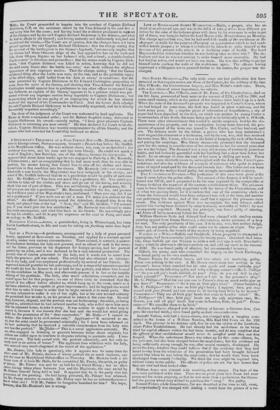CLOSE OF THE COURT-MARTIAL AT POLITSMOUTEL—We have already noticed the
written defence of Captain Dickinson. The examination of witnesses was gone into on Saturday and Tuesday—on Monday Captain Dickinson was indisposed, and the Court immediately adjourned. The defence closed on Tuesday. The Court deliberated all Wednesday. On Thursday it met at the usual hour; when the Judge-Advocate read the sentence as follows. " At a Court-martial, assembled on board his Majesty's ship Victory, in Ports- mouth-harbour, on the 26th day of August, 1829, and continued by adjournment, from day to day, Sundays excepted, until the 17th day of September, 18'29,— Present, the Hon. Sir Robert Stopford, K.C.B., Admiral of the Blue, Commander- in-Chief of his Majesty's ships and vessels at Spithead and in Portsmouth-harbour, President, the Hon. Sir Henry Blackwood, Bart., K.C.B., Vice-Admiral of the Blue, Sir Robert Waller Otway, K.C.B., Rear-Admiral of the Red, Captain Alexander Wilmot Schomberg, Captain George Mundy, C.B., the Hon. George Elliot, Captain Samuel Hood Inglefield, the Hon. William Gordon. Parsuan, to an order from the Right Honourable Lords Commissioners of the Admiraltyt dated the 18th day of July 1829, and directed to the President, setting forth that their Lordships had received from Vice-Admiral Sir Edward Codriogton three letters, of the dates stated in the margin, (14th and 24th June and 17th July 1829), setting forth the particular instances in width he had reason to dis- approve of the conduct of Captain Richard Dickinson], C.B., on board his Majesty's ship Genoa, during the action that took place at Navarino, on the 20th of October 1827, after he had assumed the command of the said ship, in consequence of Captain Bathurst being wounded and taken out the deck, and of his subsequent conduct on board the said ship until his arrival at Malta; the Court proceeded to inquire into the conduct of Captain Richard Dickinson, C.B. on the occasions stated by the Vice-Admiral in his said le:: s and to try him for the same ; and having heard the evidence produced in support of the charges, and by the said Captain Richard Dickinson in his defence, and what he had to allege in and thereof; ant having maturely and deliberately weighed and considered the whole,—The Court are of opinion, that the charges have not been proved against the said Captain Richard Dickinson : that the charge stating that the account of the battle given in the Genoa's log-book, erroneously implies that the Genoa had three Ottoman ships of the line opposed to her on the starboard side, three 60-gun frigates on her larboard side, and a-head; a double-banked frigate a-stern' is frivolous and groundless: that the return made by Captain Dick- inson, i that Captain Bathurst was killed in action, knowing that he did not die until many hours after the battle was over,' was made without the slightest appearance of any improper motive. That the charge, stating 'that the Genoa continued firing after the battle was over, at the risk, audio the probable injury of the allied ships, until hailed from the Asia to cease,' is vexatious: that the letter presented by Captain Dickinson to Sir Edward Codrington, purporting to come from the crew of the Genoa, and desiring that Vice-Admiral Sir Edward Codrington would appoint him in preference to any other officer to succeed Cap- tain Bathurst, as captain of the Genoa,' appears to be a petition which was pre. seated without any improper motive being imputable to Captain Dickinson ; but ia presenting which he was guilty of an impropriety for which he has already received the reproof of his Commander-in-Chief. And the Court doth adjudge the said Captain Richard Dickinson to be honourably acquitted, and he is hereby honourably acquitted accordingly."
The close of the judgment of the Court was welcomed by loud applause. The Master at Arms commanded order ; and Sir Robert Stopford rising, delivered to Captain Dickinson his sword—merely saving, "I have great pleasure Captain Dickinson in returning you your sword." He then declared the Court to be dis- solved; Captain Dickinson was warmly congratulated by all his friends; and the visitors who had crowded the Court-Ship hastened on shore.
A GENTLEMAN'S TREATMENT OF A POOR FRENCH Ira/IllitOR, an oil-
man in George-street, Portman-square, brought a French boy before Mr. Griffith at the Marylebone Office. He vas without shoes, hat, coat, or neckerchief ; his waistcoat was torn, and his nose and lips were bloody. Ile could not speak a word of English ;,but Burridge, one of the officers, because his interpreter. It appeared that about three weeks ago he was engaged in Paris by a Mr. Kennedy, of Baker-street ; and on complaining that he had more work than he was able to perform, his master having first forced him to take off his clothes and shoes, turned him in that condition into the streets. Mr. Kennedy (who was accommo- dated with a seat beside the Magistrate) was 'very indignant at the charge, and asked if Mr. Griffith believed that he as a gentleman would be guilty of such con- duct. Mr. Griffith—" You have not acted like a gentleman, Sir. You admit you told him to take off his clothes and shoes and go out of the house, and actually shook him out of part of them. This was not behaving like a gentleman, Sir. I tell you you are not a gentleman." Mr. Kennedy doubled his fist, and present- ing it within a yard of the Magistrate's face, exclaimed, " Dare you say, Sir, I ant not a gentleman ? If you were not so old a man, I'd make you answer for the affront." An officer immediately seized the defendant, dragged him from the bench, and placed him at the bar. " Now, Sir," said Mr. Griffith. " commit you, if you don't give the boy satisfaction." Mr. Kennedy was advised to make him some recompense, and send him back to his friends. He accordingly gave the boy his clothes, and 5/. to pay his expenses on the road to Paris, and made an apology to Mr. Griffith.
PROFITLESS USURY.--Aaron, a pawnbroker, living in Whitechapel, has been finedat Lambeth-street, in 40s. and costs for taking one farthing snore than legal interest.
TALE OF A PICTUREo—A gentleman, accompanied by a lady of great personal beauty, appeared at Bow-street on Tuesday, and applied for a warrant against an artist, under very curious circumstances. There existed, it scanned, a power- fulattachment between the lady now present, and an officer of rank in the army; and the latter, previous to his departure for foreign service, had his portrait painted by an artist, and it was declared to be a very talented production. The portrait was of course presented to the lady, and it needs not be stated how highly the precious gift was valued. The artist had also obtained an introduc- tion to the lady, and was employed professionally by several of her friends. He expressed himself grateful for her patronage, and in a respectful manner requested she would do him the honour to sit to him for her portrait, and allow him to send it to the exhibition in May next, and afterwards present it to her as the humble offering of his gratitude. The lady, after much solicitation, consented, and he waited upon her for that purpose ; on one of these visits he remarked that the portrait of the officer before alluded to, which hung up in the room, much as it had been admired, was capable of great improvement; and he begged she would allow him to take it home in order that he might retouch it in some parts. She was very reluctant to suffer it out of her sight, but at his very earnest entreaty she permitted him to take it, on his promise to return it the same day. Several days, however, elapsed, and the portrait was not forthcoming: the artist, on being applied to, admitted that he had suffered another lady, who called upon him soon after he returned home, to take it away. It was useless to apply to that lady to restore it, because it was known that she had said she would not mind giving 5001. for the possession of the " dear counterfeit." Mr. Halls—" I cannot in- terfere: the remedy is by civil action only." Applicant—" It occurred to me, sir, that the artist could be prosecuted criminally; for I have been informed on the best authority that he received a valuable consideration from the lady who IV has the portrait." Mr.:Halls--," This is a novel application certainly. We are often engaged in listening to quarrels between ladies about originals, but seldom are called upon to interfere in disputes relating to portraits only. I can- not assist you. The lady parted with the portrait voluntarily, and her only re- medy now is an action of trover." The applicant then withdrew with the lady, who seemed very much chagrined at the result of the application." Mrs. Plower, (the lady in question), who it appears was for some time the dere amie of Mr. Palmer, the loss of whose portrait she so much deplores, car-
ried the case to Marylebone Police-uffice on Thursday. Mr. Hoskins took a dif-
ferent view of it from Mr. Halls, for he committed Mr. Penny, the artist, as guilty Of felony. Mr. Palmer was sent for as bail for his friend Penny ; but au alter-
cation having taken place between him and the Magistrate, the case ended by Idr•Palmer himself being held to bail. It appears that he is the party that has possession of the painting. On bail being procured, Mr. Palmer was released, but Mr. Penny remains in custody. Mr. Penny says he has an indemnification— but of what sort ? Will Mr. Palmer be hanged or banished for him ? We hope,
however, that Mr. Hoskins's law is wrong.
LOVE AT BISHOPSOATE STREET WORKHOUSE.—SIllifil, a pauper, who has ar- rived at an advanced age, and was in the habit of taking wives from different pa- rishes for the sake of the fortunes given with them by the overseers in order to get rid of them, was brought before the Lord Mayor at the Mansionhouse on Monday. The charge against him was, that he had sealed the walls of Me workhouse at Bi- slwpsgate at night, for the purpose of keeping an appointment en Lich he had made with a female pauper ; to whom it is believed he intends to unite himself at the decease of his present wife, who is in a declining state of health. The Lord Mayor askedthe defendant whether lie was looking after another wife ? The de- fendant said that he was not seeking to make himself more miserable. He had had butftw wives, and would not have any more. He was also willing to pledge himself not to overleap the walls of the workhouse again. The officers having expressed a willingness not to proceed further in the matter, the pauper was dis- charged.



















 Previous page
Previous page